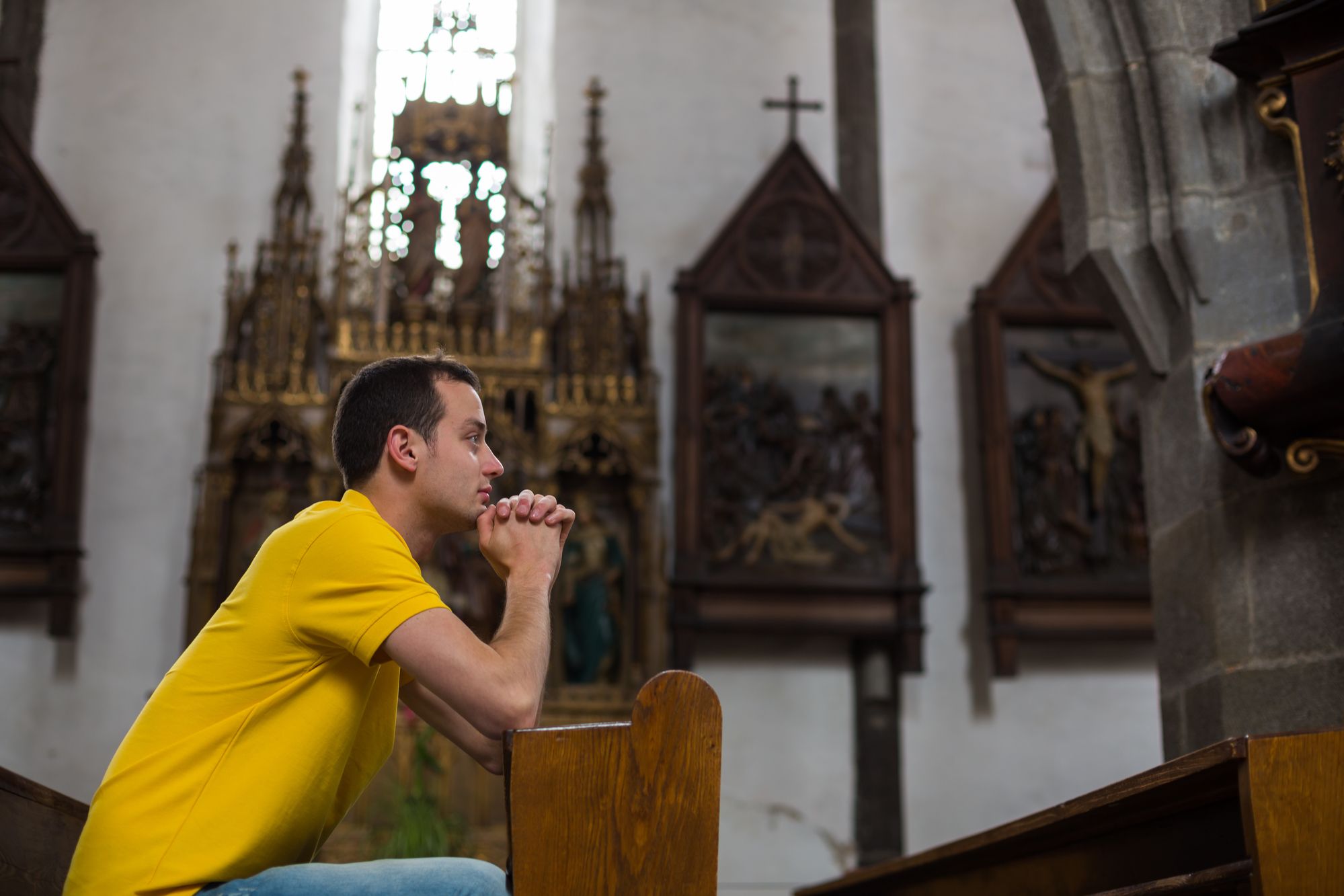 UPDATE: On December 1, 2019, the New Jersey Sexual Abuse Survivor Law went into effect. This law opens up a two-year window for sexual abuse survivors to file lawsuits, regardless of when the abuse took place. Read more here!
UPDATE: On December 1, 2019, the New Jersey Sexual Abuse Survivor Law went into effect. This law opens up a two-year window for sexual abuse survivors to file lawsuits, regardless of when the abuse took place. Read more here!
More and more survivors of New Jersey Catholic Church sexual abuse are coming forward to report their past suffering, and state Church dioceses are now formulating their responses for how they will handle clergy sexual assault claims.
The New Jersey Catholic dioceses established a compensation fund for victims of sexual abuse, according to NJ.com. Claimants that received payments from this fund also gave up their right to sue and take further legal action against the alleged perpetrators by signing a release. However, the agreements did not include a confidentiality clause for survivors, who are free to speak about the process to whomever they want at any point.
It is also important to note that compensation for survivors from this fund was determined independently by the state, as the New Jersey dioceses agreed to relinquish their control over these decisions.
The program was administered by Kenneth Feinberg and Camille Biros, the same pair who have overseen a number of other major compensation funds, including the 9/11 Victim Compensation Fund, the BP Gulf of Mexico Oil Spill Fund, and the recent Penn State sexual abuse claims.
Roman Catholic bishops in New Jersey identified nearly 200 priests who have been associated with sexual abuse of a child, according to the New York Times.
Many of the priests identified on that list have already passed away and are linked with incidents of abuse that occurred decades earlier. The list comes as a result of a criminal investigation that was launched into sexual abuse within the New Jersey dioceses five months ago by New Jersey’s attorney general.
“All New Jersey Dioceses have fully implemented comprehensive safe environment programs and together have trained more than 2.3 million adults, children, employees, clergy and volunteers,” the Trenton diocese’s website states.
“The Dioceses have conducted over 380,000 background checks on all Diocesan and parish personnel who have regular contact with children. The Dioceses remain vigilant to ensure a safe environment for every child we serve.”
This investigation followed closely on the heels of the Pennsylvania grand jury investigation that found credible allegations of abuse by more than 300 priests against more than 1,000 children.
The groundbreaking 2018 grand jury report in Pennsylvania brought forth the concerns over seven decades of accusations about child sexual abuse, leading the bishops in New Jersey to follow colleagues in other states to publish the names of suspected abusers.
The New Jersey compensation fund for victims of church sexual abuse of minors was established in response, and was intended to provide settlements to victims after evaluating individual abuse claims from victims, according to NJ.com.
“In an effort to do what is right and just, we are publishing the names of diocesan clergy credibly accused of sexual abuse of minors in the Archdiocese of Newark,” said Cardinal Joseph Tobin, who is head of the Archdiocese of Newark, according to NJ.com. “This list of names is the result of an extensive review of archdiocesan records dating back to 1940.”
The cardinal said the names on this list had previously been reported to the authorities.
Many of the priests and deacons accused of sexual abuse in New Jersey are now deceased, and the others have been permanently removed from ministry, according to the dioceses. But for survivors of this abuse—now adults—the effects and memory of the abuse continue. Though that suffering cannot be taken away, there are now steps being taken to help compensate victims of this abuse scandal.
In many cases, these allegations involve cases of abuse from many years ago. New Jersey law has recently been expanded to allow survivors of childhood sexual abuse more time to pursue litigation.
The compensation fund operated independently of the five dioceses in the state of New Jersey. The money was paid out by the New Jersey diocese in which the accused priest worked and was the first statewide compensation fund of its kind.
The fund closed on Jan. 31, 2020, after paying out more than $11 million in settlements to dozens of survivors.
Some Victims Say the Compensation Fund Isn’t Enough
More news stories have brought to light the severity of Catholic Church sexual abuse, especially in New Jersey. On Jan. 1, a priest was arrested and charged with multiple sexual assaults of children between the ages of 14 and 17. According to the Wall Street Journal, this was the first criminal case in New Jersey brought forward by the task force looking into abuse in the Catholic Church, according to the State Attorney General’s Office.
Because of the severity of Catholic Church sexual abuse in New Jersey, some victims say that the compensation fund program isn’t enough.
A New Jersey man who alleges abuse by a Franciscan clergyman as a child, Todd Kostrub, spoke out about his problem with the compensation fund, reports My Central Jersey.
Kostrub says that he can’t make a claim under the terms of the victim compensation program because while his abuser was a Catholic religious authority, he was considered a brother of a religious order and not actually a diocesan priest. Kostrub’s hopes for justice from the compensation program were dashed.
“The worst thing you can do to a victim, to a survivor, is to pretend you’re helping—that you’re doing the right thing,” Kostrub told My Central Jersey, “but in reality, what you’re doing is throwing somebody a drop of water when there’s a raging fire out there.”
Under the compensation program’s terms, Kostrub is unable to make a claim against his childhood abuser, who allegedly began raping him when he was only seven years old, an altar boy at his Catholic school. The alleged rapist, Franciscan brother Kurt Munn, had been the subject of multiple allegations of sexual abuse.
According to Mark Crawford, the New Jersey director of the Survivors Network of those Abused by Priests (SNAP), the compensation program may leave gaps that could prevent hundreds of victims from receiving compensation and some measure of justice for their suffering. Also left out of the compensation program is anyone who had previously reached a settlement with the church.
Some of the victims who settled with the church years ago may have expected there would never be any other option to seek restitution. In recent years, things have changed dramatically, and abusers within the Catholic church are finally being held accountable for their actions.
Litigation with the church is now high profile. But decades ago, victims may have thought that their voices would never be heard—settling may have seemed like the only option available to them.
One woman who settled with the church in 1992 and was in her mid-20s at the time now considers her inability to participate in this newly established compensation to be a slap in the face. Her 1992 settlement came to a total of about $12,000 after attorney’s fees and other costs.
Mark Crawford, the SNAP director who himself was a victim of clergy abuse, noted that “if the church is trying to say they want to do justice by the victims, then I certainly want to ask why would you not consider revisiting those settlements.”
“At the very least,” Crawford said, “I absolutely believe victims should be able to go back and seek counseling if that’s what they need and hopefully the church leadership will approve and do just that.”
NJ Governor Eases Time Restriction on Litigation for Sex Abuse Victims
While some victims are excluded from restricted from participation in the compensation program, others have been freed to participate in litigation with the signing of new legislation that expands the time limit significantly.
New Jersey Governor Phil Murphy signed legislation in December 2019 that eases the time limit for when childhood sex abuse victims can seek damages.
“I cannot deny victims the ability to seek redress in court for sexual abuse that often leaves trauma lasting a lifetime,” Murphy said in a statement reported by My Central Jersey.
Under this expanded statute of limitations, victims of childhood sex abuse now have until age 55 or within seven years of realizing they were harmed by the abuse. The previous statute of limitations in New Jersey is age 20 or two years after realizing the abuse caused them harm. For those previously barred by the statute of limitations, this new legislation offers a two-year look back window to pursue litigation, regardless of how long ago the alleged abuse took place.
New Jersey is one of several states that have recently expanded their sexual abuse laws.
Options for Catholic Sex Abuse Victims Moving Forward
Victims of New Jersey Catholic Church sexual abuse should carefully consider whether or not it is in their best interests to receive compensation from the fund, obtaining counseling to determine whether or not the payment is the right decision for them.
They can also benefit from support in navigating this claims process to get the maximum possible payment is recommended for anyone who finds themselves in this position.
The decision about whether or not to recover compensation and give up the right to sue can be a difficult one. Counseling is available to help survivors determine if accepting compensation from the fund is their best choice. Consulting an experienced attorney can also help survivors navigate the claims process in order to get the best possible payment.
Similar compensation funds have been created in Pennsylvania and New York. Certain individual payments have amounted to hundreds of thousands of dollars in compensation. A lawsuit filed by a group of four plaintiffs against the Diocese of Brooklyn reached a court settlement of $27.5 million.
If you or someone you love has suffered from sex abuse by a clergy member of the New Jersey Catholic Church, you are not alone, and legal help is available.
Of course, monetary compensation cannot take away the pain and suffering caused by this kind of abuse, but it can help hold those responsible — including those who helped cover up these crimes for years — accountable for their actions and inactions.
Filing a lawsuit can be a daunting prospect, so Top Class Actions has laid the groundwork for you by connecting you with an experienced attorney. Consulting an attorney can help you determine if you have a claim, navigate the complexities of litigation, and maximize your potential compensation.
If you or a loved one was sexually abused by a Catholic priest or clergy in any of the five Catholic dioceses in New Jersey, you may be entitled to compensation. Learn more by filling out the form on this page for a FREE case evaluation.
ATTORNEY ADVERTISING
Top Class Actions is a Proud Member of the American Bar Association
LEGAL INFORMATION IS NOT LEGAL ADVICE
Top Class Actions Legal Statement
©2008 – 2026 Top Class Actions® LLC
Various Trademarks held by their respective owners
This website is not intended for viewing or usage by European Union citizens.
Get Help – It’s Free
Join a Free New Jersey Catholic Priest Abuse Lawsuit Investigation
If you qualify, an attorney will contact you to discuss the details of your potential case at no charge to you.
PLEASE NOTE: If you want to participate in this investigation, it is imperative that you reply to the law firm if they call or email you. Failing to do so may result in you not getting signed up as a client or getting you dropped as a client.
E-mail any problems with this form to:
[email protected].













One thought on Should New Jersey Catholic Church Sexual Abuse Victims Take Compensation from the State Fund?